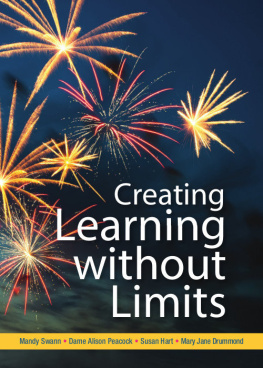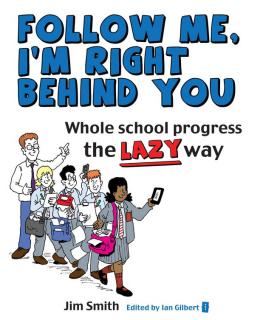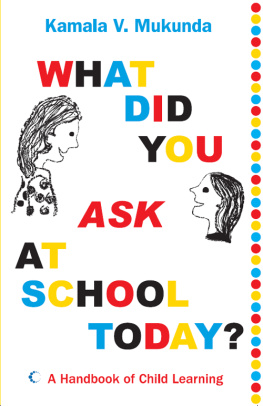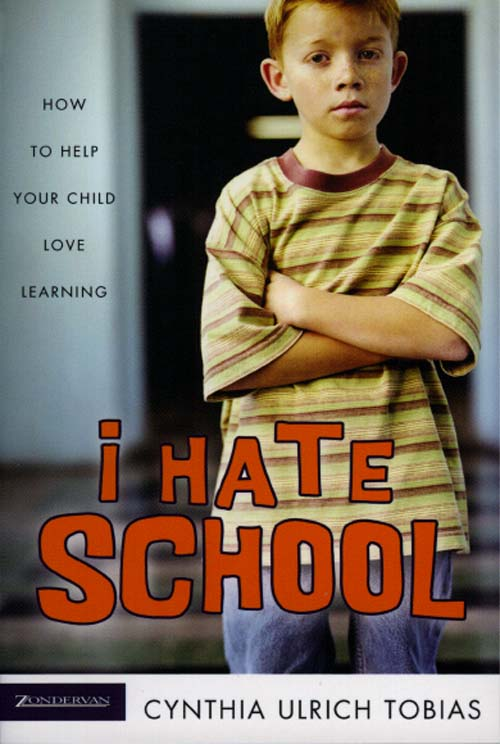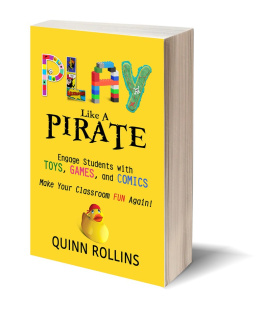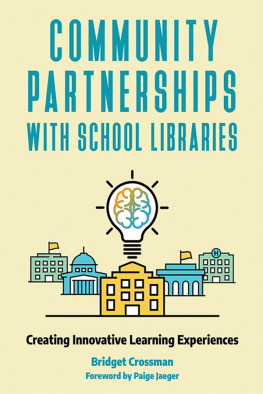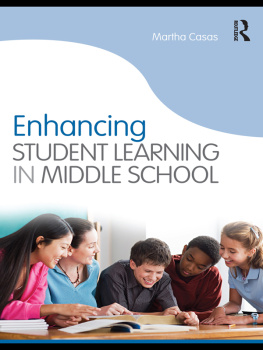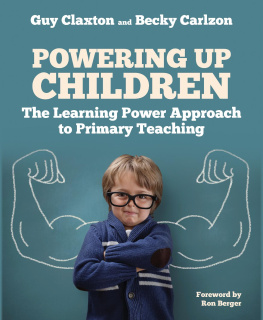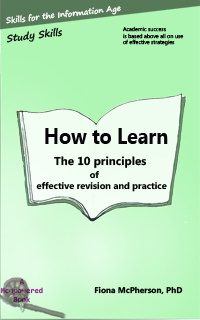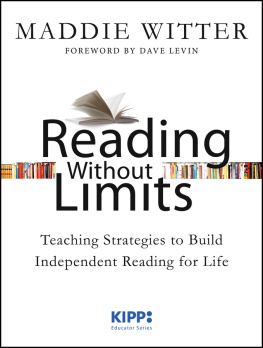Mandy Swann - Creating Learning Without Limits
Here you can read online Mandy Swann - Creating Learning Without Limits full text of the book (entire story) in english for free. Download pdf and epub, get meaning, cover and reviews about this ebook. year: 2012, publisher: Open University Press, genre: Children. Description of the work, (preface) as well as reviews are available. Best literature library LitArk.com created for fans of good reading and offers a wide selection of genres:
Romance novel
Science fiction
Adventure
Detective
Science
History
Home and family
Prose
Art
Politics
Computer
Non-fiction
Religion
Business
Children
Humor
Choose a favorite category and find really read worthwhile books. Enjoy immersion in the world of imagination, feel the emotions of the characters or learn something new for yourself, make an fascinating discovery.
- Book:Creating Learning Without Limits
- Author:
- Publisher:Open University Press
- Genre:
- Year:2012
- Rating:4 / 5
- Favourites:Add to favourites
- Your mark:
- 80
- 1
- 2
- 3
- 4
- 5
Creating Learning Without Limits: summary, description and annotation
We offer to read an annotation, description, summary or preface (depends on what the author of the book "Creating Learning Without Limits" wrote himself). If you haven't found the necessary information about the book — write in the comments, we will try to find it.
Creating Learning Without Limits — read online for free the complete book (whole text) full work
Below is the text of the book, divided by pages. System saving the place of the last page read, allows you to conveniently read the book "Creating Learning Without Limits" online for free, without having to search again every time where you left off. Put a bookmark, and you can go to the page where you finished reading at any time.
Font size:
Interval:
Bookmark:

Open University Press
McGraw-Hill Education
McGraw-Hill House
Shoppenhangers Road
Maidenhead
Berkshire
England
SL6 2QL
email: enquiries@openup.co.uk
world wide web: www.openup.co.uk
and Two Penn Plaza, New York, NY 10121-2289, USA
First published 2012
Copyright Mandy Swann, Dame Alison Peacock, Susan Hart, Mary Jane Drummond
All rights reserved. Except for the quotation of short passages for the purpose of criticism and review, no part of this publication may be reproduced, stored in a retrieval system, or transmitted, in any form or by any means, electronic, mechanical, photocopying, recording or otherwise, without the prior written permission of the publisher or a licence from the Copyright Licensing Agency Limited. Details of such licences (for reprographic reproduction) may be obtained from the Copyright Licensing Agency Ltd of Saffron House, 6-10 Kirby Street, London EC 1N 8TS.
A catalogue record of this book is available from the British Library
ISBN-13: 978-0-33-524211-5 (pb)
ISBN-10: 0-33-524211-1 (pb)
ebook: 978-0-33-524213-9
Library of Congress Cataloging-in-Publication Data
CIP data applied for
Typeset by RefineCatch Limited, Bungay, Suffolk
Printed in the UK by Bell & Bain Ltd, Glasgow

This book is dedicated to our colleagues Donald McIntyre and Annabelle Dixon who were closely involved in the Learning without Limits project from its inception. Both have made irreplaceable contributions and are deeply missed.
This will undoubtedly turn out to be amongst the most important educational books of the decade. Our capacity to respond, both individually and collectively, to its key insights and messages will profoundly affect not just the quality of our schools, but of our society for years to come.
Engagingly and eloquently written, it exposes the intellectual bankruptcy and human destructiveness of widely held concepts of ability and offers a richly textured, practical account of how one school moved from failure to OfSTED outstanding by committing itself to the practicability of a morally inspiring, educationally convincing alternative.
If you want to know why the standards agenda must inevitably fail and what we might do instead, read this book.
Professor Michael Fielding, Institute of Education, University of London, UK
This is an inspiring and reviving book. It reminds us why people come into education to make a difference for children. To make a deep difference we have to organize education differently. It describes a school that vibrates with learning in an atmosphere of deep humanity and care. Its practices are light years away from the measuring, labelling, targeting, and testing structures that have become our recent national norm. The school as a whole community transforms people.
Anne Watson, Professor of Mathematics Education, University of Oxford, UK
This book provides a grounded demonstration of the importance of educational principles, the most important of which is the understanding that each childs potential for learning is limitless. The authors describe new school and classroom practices through which learning can be transformed. Their argument has influenced government thinking on the review of the National Curriculum in England. I urge you to let it influence your thinking too!
Professor Andrew Pollard, Institute of Education, University of London, UK
This is a brilliant study of a small and very successful primary school in Hertfordshire where the teachers have rejected ideas of fixed innate ability and believe instead in the limitless potential of all young people. At a time when the Ofsted inspection process employs dubious and limited notions of standards and achievement, it would be good to think that there could be many more schools like this one showing the way towards a new and liberating view of human development. The book deserves a really wide readership.
Professor Clyde Chitty, Institute of Education, University of London, UK
This book is slim in size but hefty in significance. It tells the story of a school driven by ambition, hope and the self-confidence that comes from a profound faith in the capacity of every child to be a passionate and engaged learner. This in the face of powerful and societally dominant messages that explicitly or more insidiously tell a different and more deterministic tale: that children (and schools) are fit and proper subjects for classification, measurement and management. And theres more the careful scholarship on which this story is based prevents this book from being merely a description of what happens when a unique constellation of propitious circumstances meets a charismatic leader: this other way is open to all who will take it but it will demand the laying of solid and value-rich foundations, the exercising of autonomy for staff and pupils, the rethinking of relationships, a focus on learning (letting performance come as a secondary gift), and the taking of collective action.
Its become a clich to say of a book that it Should be read by every teacher (or parent, or whoever ). This one, and its predecessor Learning without Limits merit that injunction.
Barry Hymer, Professor of Psychology in Education, Education Faculty, University of Cumbria, UK
Creating Learning without Limits provides a welcome tonic that can help to offset the beleaguering effects of a performativity and standards agenda that reinforces the ability based practices so pervasive in schools today. Building on the compelling pedagogy first presented in Learning without Limits, this inspiring book shows how an alternative school improvement agenda can produce high academic attainment and enhanced capacity to learn for everybody. A classic for our time, it should be read by all who seek approaches to teaching and learning that are free from externally imposed views of ability and potential.
Professor Lani Florian, School of Education, University of Aberdeen, UK
5 Putting learning first: creating a school-wide culture of learning
This is the story of a school a primary school in Hertfordshire which we have studied over a number of years. We, the research team and the headteacher, undertook the study in order to understand more about the big idea that was at the heart of the developments that took place there during the research period. As we shall show, in many respects The Wroxham School is not unlike thousands of other schools up and down the country. The building is typical of its type; the profile of learners is not unusual. The staff group has a predictable range of experience and qualifications. The budget is not enhanced in any way. The school is subject to the same pressures and demands from the local authority, Department for Education and the Office for Standards in Education as every other school.
But there is one feature of Wroxham that makes it distinctive: the vision that guides the work of the whole community, and the model of school development to which it gives rise. Embedded in that work is a fundamentally different view of learners and learning, of curriculum and pedagogy, from that promoted by the standards agenda, and a radically different approach to the distribution of leadership, power, monitoring and accountability.
Next pageFont size:
Interval:
Bookmark:
Similar books «Creating Learning Without Limits»
Look at similar books to Creating Learning Without Limits. We have selected literature similar in name and meaning in the hope of providing readers with more options to find new, interesting, not yet read works.
Discussion, reviews of the book Creating Learning Without Limits and just readers' own opinions. Leave your comments, write what you think about the work, its meaning or the main characters. Specify what exactly you liked and what you didn't like, and why you think so.

